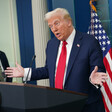Media Watch 14 December 2019

Jared Kushner took to the pages of The New York Times to push his father-in-law’s executive order which threatens free speech and equal rights.
ZUMA PressThe New York Times opinion section doesn’t play fair. That is not exactly a revelation but sometimes enough is enough and the newspaper’s anti-Palestinian bias needs to be reiterated.
A new executive order signed by President Donald Trump threatens the First Amendment rights of students. They could be punished merely for saying that Israel is a racist endeavor because it denies equal rights to all people between the Jordan River and the Mediterranean Sea.
Trump’s embrace of the International Holocaust Remembrance Alliance definition of anti-Semitism means federal dollars could well be cut or pulled entirely over certain criticisms of Israel.
Students face the prospect, mind you, of being told it is anti-Semitic to advocate for equal rights for Palestinians or for advocating that Israel become a state for all citizens rather than an exclusivist Jewish state.
In the face of this emerging government attack on free speech, what does the newspaper of record do? It gives first word to Jared Kushner, the president’s son-in-law and courtesy of the administration’s nepotism a senior adviser to the president, providing space for an op-ed to defend the executive order.
Of course, Kushner is silent in the op-ed on his father-in-law’s own anti-Semitic speech from the prior weekend. That speech gave succor to the bigoted views of white nationalists with its suggestion of Jews as “brutal killers” driven by their wealth and indulged in misrepresentations of the Palestinian-led movement for boycott, divestment and sanctions.
For Trump and Kushner, the only good Palestinian is a quiet Palestinian – or a dead one as their support for Israeli attacks on Palestinians in Gaza has made clear, along with their decisions to cut off vital aid to Palestinian refugees.Kushner is clear in expressing the administration’s view that opposing Zionism – Israel’s state ideology – amounts to anti-Semitism.
If that’s the case, Palestinians and their allies will be expected to shut up about how Israel’s state ideology has dispossessed them or how they’re living under the boot of a racist state with discriminatory laws.
That’s the new anti-Semitism identified by the Trump administration – while no one in the administration seems to have ideas on how to stop violent anti-Semitic attacks from Jersey City to Pittsburgh to Poway.
One thought: Stop employing racist language to divide Americans and stop praising racists as “very fine people.”
Will intimidation work or backfire?
The Trump-Kushner tandem think they can intimidate their way to quiescent students on US campuses.
I suspect, however, that they’ve seriously miscalculated and will get more pushback than ever with louder calls than ever for equal rights for Palestinians. Government coercion intended to curtail calls for equal rights may well lead to students being more, not less, vocal about the injustices faced by Palestinians.
Students being told they need to keep quiet about Palestinian rights seems like a surefire means to produce the opposite result.
But that’s not certain. University action to kick student activists off campus will be closely watched around the country and could suppress opposition.
If government intimidation wins the day, with administrators helping carry out a silencing campaign, there’s no telling what might be ordered next.
But the assault on free speech rights is plenty alarming without speculating on whether or not it will work.
And in that effort, it must be said that James Bennet, New York Times editorial page editor overseeing the opinion department, is helping lead the way with the Kushner piece.
Kushner has been given first shot at defining the issue, much as cable news outlets consistently provide Israeli spokespeople with first go at framing the narrative around Israeli military attacks on Gaza.
The Kushner op-ed, of course, follows Bennet’s hiring of Bret Stephens and Bari Weiss, notorious anti-Palestinian writers.
Weiss, in particular, has pushed to the fore a crackdown on campus free speech, both from her days working against Palestinian academics at Columbia University and her more recent writing for The New York Times.
A freedom movement deserves better
But The New York Times wasn’t done. It also ran an editorial of its own on the subject (while running this better op-ed the next day).
The editorial rightly included mention of violent right-wing anti-Semites with their deadly attacks on American Jews and pointed to free speech concerns.
Yet it also found time to attack the BDS movement and misrepresent student actions at Emory University.
“Whatever its intent,” the editorial declared, “BDS has helped to create a hostile environment for Jewish students, most of whom support Israel. At Emory University, for example, students with mezuzot on their door posts were served with mock eviction notices.”
This is profoundly misleading, to the extent that a correction ought to be issued.
First, many readers will conclude from the framing that only Jewish students received the eviction notices. This is false as Emory officials have themselves admitted, some more candidly than others.
Secondly, what were these eviction notices? They were educational material explaining what happens to Palestinians living under Israeli occupation.
That critical detail goes unnoted.
Nearly simultaneous Islamophobia at Emory, meanwhile, passes without notice by The New York Times. Of course, that’s hardly surprising as Emory’s police somehow determined that the desecration of a Muslim ablution room was an “accident.”
The urine and feces, however, suggest otherwise.
An article on the subject by The Emory Wheel reads like a subtle report on a police cover-up. Edward Ahmed Mitchell, executive director of the Georgia Chapter of the Council on American-Islamic Relations, told The Electronic Intifada that he was “skeptical” this was an “innocent mistake.”
A more thoughtful editorial from The Times would have covered events at Emory more fully and fairly and said far more about what the BDS movement is attempting to accomplish.
Such omissions are no surprise.
Just a day earlier, Peter Baker and Maggie Haberman wrote an explanatory New York Times article on Trump’s executive order which described BDS as a “movement against Israel.” A different New York Times article published online Thursday evening referred to “the burgeoning anti-Israel movement on college campuses.”
Missing from both articles – the second article didn’t even reference BDS – were key facts. Namely, BDS is a nonviolent movement. It’s calling for equal rights for Palestinian citizens, an end to the Israeli occupation and the right of return for Palestinian refugees.
A “movement against Israel” is more menacing, however, and so that’s what readers got.
Spin that emphasizes anti-Israel sentiment rather than calls for Palestinian freedom and equal rights is misleading and unfair. It keeps readers uneducated about a powerful social justice movement modeled on the effort to divest from apartheid South Africa.
This freedom movement deserves better, more honest coverage.
Where, it should be asked, are the Palestinian voices on the op-ed page who can raise profound concerns about government intimidation and the trampling of the First Amendment, while saying in their own words what the BDS movement advocates?
Or should would-be government censors always be given priority by the newspaper of record?





Comments
N.Y. Times= Right Wing Ideology
Permalink Stefano R. Baldari replied on
The New York Times has always been an unreserved, unequivocal, and unapologetic supporter of Zionist Israel with no questions asked. Despite Israel's racist policies since its inception in 1948, and its discrimination, and its violent and murderous acts against Palestinians, Black African Sudanese and Ethiopians, Arabs, Christians, Druze, and Muslims for the New York Times, Israel can do no wrong. But, lest anyone be deluded, this should come as no surprise. The New York Times has continually been a self-promoting pseudo-liberal newspaper throughout its history, despite Americans' belief as "The Paper of Record". Historically, the Times has always been a right wing, right of center newspaper, one need to only read its articles from 75, 100, and 150 years ago (and nothing has changed since) and its attacks on the Irish (for being Catholic), its attacks on Italians (who were not considered civilized or European white), its attacks on the poor, communists, socialists, anarchists, and so forth.
In addition to all of the above, the New York Times has been a near total supporter of foreign wars, particularly wars in the Middle East that, in fact, support Israel's hegemony there. Finally, the Times has been a supporter of nearly all, if not all, American instigated coups in foreign countries throughout the world since WWII--read William Blum's book, "Killing Hope..."
To read the New York Times and believe that it would denounce and condemn Israel for many of its violent and criminal acts, and its crimes against humanity toward Palestinians, et al would be to set oneself up for disappointment.
Finally, if one wants to learn the truth regarding Israel, read elsewhere!
Irony
Permalink Frank Dallas replied on
It's always possible to use a little irony. If they ban criticism of Israel and Zionism, it's always possible to say things like this: Zionists are entirely virtuous. Israel loves Palestinians. Zionists have never advocated violence against Palestinians. Israel is a great democracy which does not discriminate against anyone. Zionists have never engaged in racism. Zionism has never been guilty of the antisemitism it condemns. Zionists have never committed acts of terrorism. Israel is not an ethnocracy etc....
I guess they could ban these too on the grounds that their irony is obvious, but it'd be interesting watching them try.